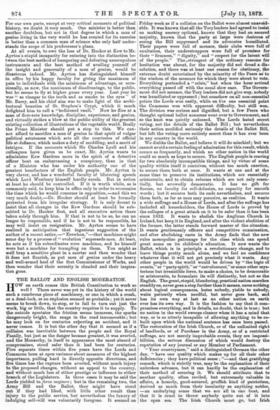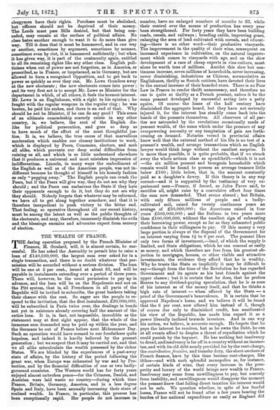THE BALLOT AND ENGLISH MODERATION.
laow on earth comes this British Constitution to work so well? There never was yet in the history of the world such a cumbrous piece of machinery, or one in which a crash, or a dead-lock, or an explosion seemed so probable ; yet it never seems to break down, to stop, or to fail to turn out just the work, big or little, that the country requires it to supply. To the outside spectator the friction seems immense, the sparks dangerously bright, the snags in the road innumerable ; but he may look on for centuries expecting an accident, and it never comes. It is but the other day that it seemed as if a collision was inevitable between the people and the Royal Family, but just as the danger became greatest, it was averted, and the Monarchy, in itself to appearance the most absurd of compromises, stood safer than it had been for centuries. Five separate times within five years have the Lords and Commons been at open variance about measures of the highest importance, pulling hard in directly opposite directions, and five times has the rupture been averted, without much injury to the proposed changes, without an appeal to the country, and without much loss of either prestige or influence to either branch of the Legislature. In three cases it may be said the Lords yielded to force rnajeure; but in the remaining two, the Army Bill and the Ballot, they might have stood out if they had liked, with little other result than injury to the public service, but nevertheless the luxury of indulging self-will was voluntarily foregone. It seemed on
Friday week as if a collision on the Ballot were almost unavoid- able. It was known that all the Tory leaders had agreed to insist on making secrecy optional, known that they had an assured majority, known that the party at large were desirous of seeing the Bill suppressed and its advocates humiliated. Their papers were full of menace, their dabs were fall of exultation, their understrappers were full of promises for their "firmness," "dignity," and "respect for the latent will of the people." The ,strongest of the ordinary reasons for hesitation was absent, for the majority did not dread a dis- solution, and there was at least one reason for obstinacy, the extreme doubt entertained by the minority of the Peers as to the wisdom of the measure for which they were about to vote. Everything portended a "crisis," but when the hoar arrived everything passed off with the usual slow ease. The Govern- ment did not menace, the Tory leaders did not give way, nobody was humiliated or oppressed ; but somehow on all non-essential points the Lords won easily, while on the one essential point the Commons won with apparent difficulty, but still won. The division was serious and dignified, but a few Peers who thought optional ballot nonsense went over to Government, and so the knot was quietly unloosed. The Lords hated secret voting, not the details of the Ballot Bill ; but nevertheless their action modified seriously the details of the Ballot Bill, but left the voting more entirely secret than it has ever been in any country in the world.
We dislike the Ballot, and believe it will do mischief; but we cannot avoid a certain feeling of admiration for this result, which occurs so frequently, and which no other nation in the world could so much as hope to secure. The English people is craving for two absolutely incompatible things, and by virtue of some quality within itself it contrives, without too much exertion, to secure them both at once. It wants at one and at the same time to preserve its institutions, which are essentially aristocratic, and to obtain reforms which are not only essen- tially, but avowedly democratic. It has no gift for finesse, no faculty for self-delusion, no capacity for smooth words ; but it secures both its ends nevertheless, and secures them both, as far as man may perceive, as realities. It wants a wide suffrage and a House of Lords, and after the suffrage has included all householders, the House of Lords is proved by the collapse of a great attack on it to be safer than it has been since 1832. It wants to abolish the Anglican Church in Ireland, but keep it in England, and after the violent abolition of the former, the latter stands forward master of the situation. It wants gentlemanly officers and competitive examination, and after abolishing caste in the Army finds that the new rules monopolize patronage for the class which can spend great sums on its children's education. It now wants the Ballot, which is in principle a revolutionary change, and to leave things pretty much alone, and we feel no confidence whatever that it will not get precisely what it wants. Any other people in the world would be driven by "the logic of events," or "party spirit," or "entrainemeat,"or some other mys- terious but irresistible force, to make a choice, to be democratic or aristocratic, to formulate its will distinctly, but not so the English. The great, stupid, blundering, practical nation marches steadily on, never goes a step further than it means, cares nothing about logical consequences, hates nobody, yields to nobody, waits patiently when needful, but never goes back, and has its own way at last as no other nation on earth ever has its own way. It is the fashion to say that it com- promises everything, and in details, no doubt, that is hue; but no nation in the world sweeps cleaner when it has a mind that way, or is so utterly incapable of allowing anything to be re- built upon which the national sentence has once been passed. The restoration of the Irish Church, or of the unlimited right of landlords, or of Purchase in the Army, or of a restricted suffrage, are not merely improbable events, they are impossi- bilities, the serious discussion of which would destroy the reputation of any journal or any Member of Parliament. - "Your countrymen," said a distinguished German the other day, "have one quality which makes up for all their other deficiencies ; they have political sense ; "—and that gratifying remark, which is strictly true, may be the explanation of their unbroken advance, but it can hardly be the explanation of their method of securing it. We should attribute that to another quality, often reviled, but extreemely valuable in affairs, a homely, good-natured, gruffish kind of patriotism, derived as much from their insularity as anything nobler, —an underlying sense that we are all in one boat, and that it is cruel to throw anybody quite out of it into the open sea. The Irish Church mast go, but Irish clergymen have their rights. Purchase must be abolished, but officers should not be deprived of their money. The Lords must pass Bills desired, but that being con- ceded, may remain at the surface of political affairs. No class hates another enough to want it to do more than give way. Till it does that it must be hammered, and in one way or another, sometimes by argument, sometimes by menace, sometimes even by riot, it is hammered sufficiently ; but when it has given way, it is part of the coalmunity again, entitled to all its remaining rights like any other class. English poli- ticians when out of power are not forgotten, as in America, or proscribed, as in France, or imprisoned, as in Germany, but are allowed to form a recognised Opposition, and to get back to power as quickly as ever they can. Mr. Lowe thunders away at the new electorate ; the new electorate comes into power ; and its very first act is to accept Mr. Lowe as Minister for the department in which, of all others, it feels the keenest interest. Mr. Lowe is an Englishman, with a right to his opinion ; he fought with the regular weapons in the regular ring ; he was beaten, he paid his stakes, and there is an end of that. Why should he not be Minister, if he can do any good ? This sense of an ultimate comradeship scarcely exists in any other country, is, we believe, the root of the English dis- like for political persecution, and goes so deep as to have much of the effect of the most thoughtful jus- tice. It is, we believe, the true cause of that marvellous moderation which enables our clumsy institutions to work, which is displayed by Peers, Commons, electors, and mob all alike, which prevents our deep social difficulties from ruining us all, and which is so little understood elsewhere that it produces a universal and most mistaken impression of indifferentism. Lincoln, in many ways the embodiment of the English as well as of the American people, was not in- different because he thought of himself in his homely fashion as only "pegging away." The English people can crush the Peers, but if the Peers will give way, they do not see why they should ; and the Peers can embarrass the State if they hate their opponents enough to do it, but they do not see why they should. Nobody forgets that whatever may be reformed, we have all to get along together somehow, and that it is therefore inexpedient to push victory to the bitter end. That feeling, so operative throughout all our recent history, must be among the latent as well as the public thoughts of the electorate, and may, therefore, immensely diminish the evils and the blessings enemies and advocates expect from secrecy of election.



































 Previous page
Previous page